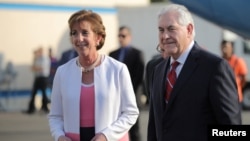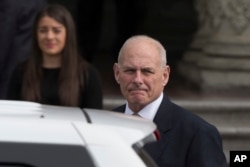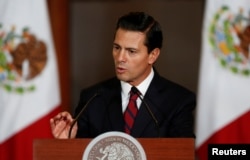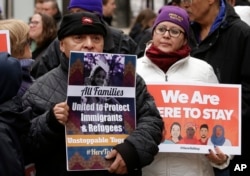Two key members of U.S. President Donald Trump's Cabinet are hoping to soothe concern and anger about the new U.S. administration's policies toward Mexico.
Secretary of State Rex Tillerson and Homeland Security Secretary John Kelly meet Thursday with Mexican President Enrique Pena Nieto and members of his Cabinet, in what is expected to be the first in a series of high-level meetings focusing on drug trafficking, trade and immigration.
"It's significant that the president is sending the secretaries to Mexico so early in his administration," White House press secretary Sean Spicer said Wednesday. "It's symbolic of the meaningful relationship our two nations have."
Spicer also referred to relations between the two countries as "healthy and robust."
WATCH: Spicer on US-Mexico relationship
Low point in relations
The trip comes at what is seen as a low point in relations between the two countries, which have enjoyed peace along their 3,100-kilometer border since the Mexican-American War of the late 1840s.
Trump has repeatedly insisted that Mexico, one way or another, must pay for a border wall, which lawmakers in Washington estimate would cost at least $12 billion. And just this week, the U.S. Department of Homeland Security outlined policies that could result in the deportation of millions of undocumented immigrants.
On Wednesday, Mexican Foreign Minister Luis Videgaray, quoted by Reuters, said his country would not accept new "unilateral" U.S. immigration proposals and would not hesitate in taking the matter to the United Nations.
"This is a low point in U.S.-Mexico relations, and an abrupt break from the last 30-plus years of cooperation," said Shannon O'Neil, senior fellow for Latin America studies at the Council on Foreign Relations.
Kelly, a retired Marine Corps general, has long-standing relations with Mexican leaders from his previous job as head of the U.S. Southern Command. Before heading to Mexico, he went to Guatemala to meet with President Jimmy Morales and observed the arrival of a DHS repatriation flight at a government facility in Guatemala City.
U.S. officials said Tillerson, a former an oil-and-gas corporation chief executive, and Kelly would discuss border security, law enforcement cooperation and trade, among other issues.
Aside from Nieto, the two are also scheduled to meet the Mexican ministers of interior, foreign relations, finance, national defense and the navy.
Call did not go well
The talks come weeks after Trump and Nieto spoke by phone on January 27, following the U.S. president's inauguration.
The call did not go well, according to officials in both countries who spoke on condition they not be named. Media reports said Trump chided his Mexican counterpart for failing to control drug trafficking and suggested the United States might even deploy troops to defeat narcotics cartels on Mexican territory.
Nieto then canceled a planned trip to Washington.
Mexican officials have rejected calls by Trump to pay for a border wall. "Mexico wants to build bridges, not walls," Videgaray said last week.
Thursday's meetings in Mexico City will focus "on how we can build a constructive relationship," according to a senior U.S. administration official. "It's forward-looking. The wall is just one part of a broader relationship that we have."
Despite serious differences on a number of fronts, the official added, "I think we'll achieve a lot of success."
Trust 'has been broken'
That prediction may prove to be too optimistic, according to some regional specialists.
"While the visit will go some way to smoothing bilateral discussions, there is a hard-earned trust that has been broken, and that can't be repaired with a high-level visit," O'Neil told VOA.
During the 2016 presidential campaign, Trump referred to some Mexican immigrants in the United States as rapists and criminals.
Another U.S. official said it was "important to view this with a very long lens" and not focus on any particular contentious aspect of the relationship. "Both presidents are keen to set a positive tone, a constructive tone moving forward."
Immigration, deportation
While the two Cabinet members look to smooth relations, they will also be explaining the latest orders issued by Trump regarding immigration and deportations.
New policies being enacted at DHS will lead to hiring thousands more enforcement agents, expanding the number of immigrants targeted for deportation, prioritizing removal hearings for them and obtaining the help of local police to make arrests.
The actions have generated alarm in other countries, none more so than Mexico — the origin of an estimated 6 million undocumented people in the United States.
Such actions are prompting calls from prominent Mexicans for pushback.
"The Trump administration's hostile beginning has also shifted Mexico's domestic politics," O'Neil said. "Rising nationalism there will make compromises with the United States all the harder as Mexico looks toward its own 2018 presidential race."
Buy Mexican
Mexico's richest businessman, Carlos Slim, whom some want to run for president next year, during a recent rare news conference called for people in his country to buy domestic products and not surrender to Trump's demands.
The United States is Mexico's largest trading partner. The two countries plus Canada have their economies intertwined as a result of the North American Free Trade Agreement (NAFTA).
Trump wants to make changes to NAFTA, which went into force 23 years ago. "We're going to review all the trade deals that are out there," spokesman Spicer told reporters Tuesday.
Any attempt to introduce quotas or tariffs to NAFTA would be disastrous for the treaty, Mexican Economy Minister Ildefonso Guajardo said Tuesday at a conference in Toronto about the future of North America.
Current and former Canadian government officials are pledging to not sacrifice trade ties with Mexico to cut a better bilateral deal with Washington should NAFTA be renegotiated.
Canada's government should not throw Mexico "under the bus," said former Prime Minister Brian Mulroney, who spoke at the same event.










